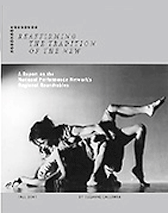Helping funders and arts organizations realize their vision since 1996.
PUBLICATIONS
Suzanne and Callahan Consulting for the Arts [craft] large-scale and complex research studies that are immediately usable, understandable and relevant to our field. She prioritizes our vision and our input throughout the entire process, swiftly transforming our goals into action, and her experience and insights made our conceived project richer and more impactful than we had hoped.
—Krista Bradley, Director of Programs and Resources, the Association of Performing Arts Professionals (APAP)
In March 2024 the Doris Duke Foundation’s (DDF) Arts Program launched a request for proposals for phase one of the Performing Arts Technologies Lab (PATL), which would provide support for rapid prototyping and feasibility testing of big ideas at the intersection of the performing arts and digital technology. As a service to the field, DDF commissioned Callahan Consulting for the Arts to review the 745 applications for characteristics and themes and report this learning to the field. In their project designs and methodologies, applicants combined a wide variety of methods, tools, and ideas. Across applications, artists and organizations are pursuing technology use within their artmaking to expand, if not transform, the art works being created; to deepen their interactions with audiences; to experiment with the myriad of possibilities that new technology allows, letting artists dream in new and bigger ways that were unimaginable even a few years ago; and to share knowledge with peers.
Read our findings here.
Download an infographic about findings here.
Read about PATL on the DDF website here.
With support from the Wallace Foundation, the Association of Performing Arts commissioned Callahan Consulting for the Arts to conduct a preliminary qualitative study and largescale quantitative study to learn about the realities and needs of small and midsized presenters, many of whom operate in rural areas. Surveys, focus groups, and interviews illuminated their circumstances and offered insights for the field.
In the summer of 2020, amidst the COVID-19 pandemic, widespread closures of many arts organizations raised questions about how the presenting industry would do its work in 2020 and beyond. Respondents shared their circumstances and stories in a supplemental study.
Read the Executive Summary
Read the Full Report
Read the COVID-19 supplement
Callahan Consulting for the Arts (Callahan Consulting) conducted a study for The Joyce Theater (The Joyce), funded by The Andrew W. Mellon Foundation (The Mellon Foundation), to determine how The Joyce might better support choreographers in developing work of the highest artistic quality. The Joyce and The Mellon Foundation shared this research with the dance field so that its findings might be used to inform or improve other programs. The study examined and gathered a wide range of information, including data from 132 colleges, 37 written sources, 43 interviews/consultations, and four site visits. Research explored: the professional choreographic training opportunities currently available in the United States through college programs and from other organizations and individuals; the training (or lack thereof) of select choreographers working in the United States and the factors that contributed to the development of their choreographic voices; and select training methods in Europe.
View a Short Synopsis of Findings
Download the Executive Summary (391 KB PDF)
Read the Full Report
Illustrated the challenges the field faces, its extensive reach through grass-roots tap festivals, and its potential for growth across the US.
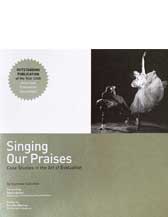
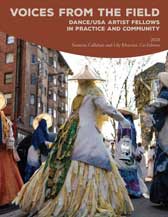
An article series and book. The publication’s 15 writers capture and raise visibility for the Fellows’ practices and stories. They are intended for use by “artists, academicians, funders, presenters, cultural practitioners, and community workers who understand that the plurality of creative voices reflecting people of color and other historically marginalized people must be valued and welcomed into the pantheon of what constitutes American dance.”
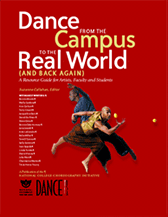
The culmination of four years of activity, this book is designed to benefit faculty, administrators, and emerging and professional artists, as well as the next generation of dancers throughout the country. It responds to a major trend: colleges once again are primary sites for the dance field’s development. “Residencies 101” guides artists and faculty in working together to plan successful residencies. “Universities 101” guides those who are considering faculty positions on what to expect and ask. “Real World 101” orients young dancers (and faculty) to what life will be like once they graduate from college and begin a career. Published by Dance/USA’s National College Choreography Initiative (NCCI).
Extensive research culminated in a plan for dance service provision. It illuminated artists’ needs to dance leadership in the city, including artists and funders.
Learn more about this report
Download the Executive Summary (514 KB PDF)
Download the Full Report (2 MB PDF)
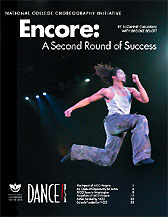
These three publications on the funding program that Callahan Consulting runs for Dance/USA capture the effect that prestigious dance artists had on campuses across the country, not only through their profound engagement with students, but also in the waves of activity they generated on the local level:
National College Choreographer Initiative: Bringing it Home – A Third Wave of Creative Collaboration. Round 3, 2004-05.
National College Choreography Initiative: Encore – A Year of Success. Round 2, 2003-04.
National College Choreography Initiative: Supporting the Past, Present and Future of American Dance. Round 1, 2001-02.
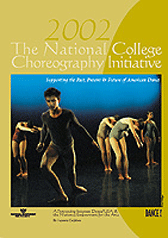
Developed from college faculty and professional artists in a series of national forums, the report documents the profound changes in ways of working that are facing artists and college dance departments, and makes recommendations about steps that might be taken to increase the quality of collaborations for both working artists and colleges.
Download the Executive Summary (47 KB PDF)
This report on the NPN’s strategic planning process documents the major issues facing community-based arts organizations and the vital role this network plays in supporting artists, their work, and the communities they serve.
Download the Executive Summary (719 KB PDF)
Request a free copy
